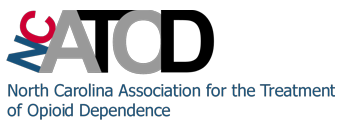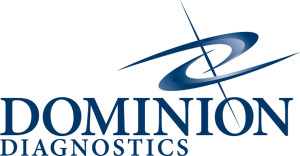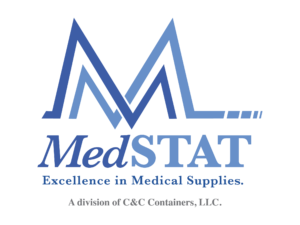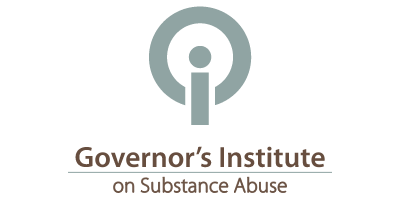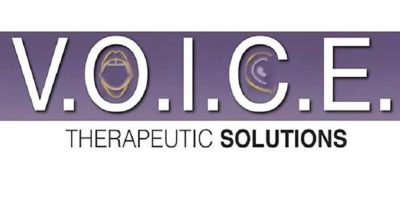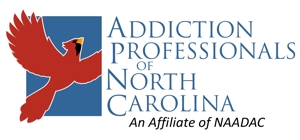NCATOD supports and empowers NC treatment professionals to enhance the quality of patient care in treatment programs by promoting the growth and development of comprehensive opioid treatment services throughout North Carolina.
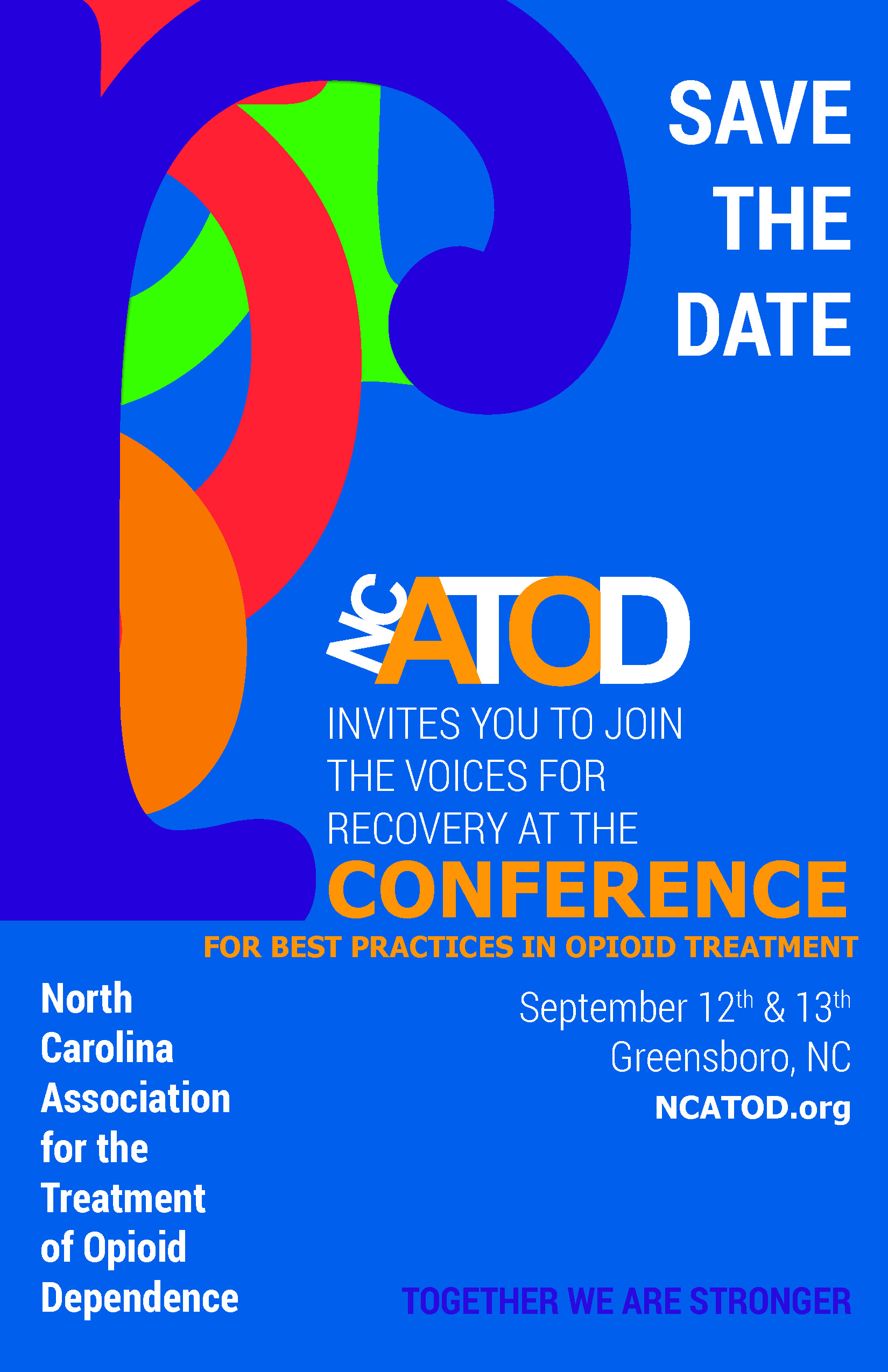
About the Annual NCATOD Conference
The North Carolina Association for the Treatment of Opioid Dependence (NCATOD) is once again proud to present the 2019 Conference for Best Practices in Opioid Treatment: Voices for Recovery.
Sessions have been designed to meet the specialized needs of professionals working with medicated-assisted therapies with specific focus areas for nurses, administrators, clinicians and managers.
This year, we are excited to bring Substance Abuse Professionals together for the following objectives:
- We will identify advocacy roles, issues, and opportunities for opioid treatment providers across the spectrum of opioid treatment.
- We will explore the “Team Concept of Care” in an OTP to address issues of significance with a multidisciplinary approach to care.
- We will provide a unique opportunity to network with opioid treatment colleagues in Addiction Nursing and Counseling from across the state.
NCATOD is the North Carolina affiliate of the American Association for the Treatment of Opioid Dependence (AATOD), which was founded in 1984 to enhance the quality of patient care in treatment programs by promoting the growth and development of comprehensive opioid treatment services throughout the United States.
Who Should Attend?
This conference is for nurses, counselors and support staff working in the field of Medically Assisted Treatment, such as:
- Social Workers
- Marriage and Family Therapists
- Professional Counselors
- Mental Health Counselors
- Nurses
Thursday, September 12, 2019
4:00 – 5:30 p.m. — Registration Opens
5:30 – 6:00 p.m. — Networking Dinner (Sponsored by Acadia Healthcare)
6:00 – 8:00 p.m. — Announcements, Welcome, and Opening Plenary
Announcements & Welcome
Kenny House, NCATOD President
Plenary: Embracing Your Client: Are you a Recovery Oriented Provider?
Latanya Dubois, MPA-Masters in Public Administration and Public Policy
(NBCC CREDIT NOT AVAILABLE FOR THIS SESSION)
Friday, September 13, 2019
7:45 – 8:30 a.m. — Registration & Networking Breakfast
8:30 – 10:00 a.m. — Morning Plenary
Collaboration and Isolation: The Art of Working Together
James E. Campbell, LPC, LAC, MAC, CAC-II
10:00 – 10:15 a.m. — BREAK
10:15 – 11:45 a.m. — Concurrent Breakout Sessions I
Session A:
Methodone Drug Interactions | Christina Camielle Bannow, MSN, APRN, FNP-C
(NBCC CREDIT NOT AVAILABLE FOR THIS SESSION)
Session B:
Incorporating Self-Help Recovery Groups into Clinic Operations | Nicholas Cawby, CSAC
(NBCC CREDIT NOT AVAILABLE FOR THIS SESSION)
Session C:
Service. Striving for Excellence | Amy Garner
(NBCC CREDIT NOT AVAILABLE FOR THIS SESSION)
Session D:
Quantifying Outcomes that Matter: An Opioid Treatment Program’s Story | Scott Luetgenau, MSW, LCAS
Session E:
Drug Overdose Rapid Responder Initiative | Nicole Singletary, Injury and Drug Prevention Consultant, BA; Benji Currie, APP (Advanced Practice Paramedic); and Justin Garrity
11:45 – 1:15 p.m. — Luncheon Session: State Update
Panel by the Division of MHDDSAS, NC Dept. of Health and Human Services
Joanna Eller, MA, LCAS — Coordinator, NC State Opioid Treatment Authority
Stacey Klaman MPH, PhD — Associate Coordinator, UNC Birth Partners Volunteer Doula Program
Starleen Scott Robbins, MSW, LCSW — MH Program Manager, Women’s Services Coordinator
DeDe Severino, MA — Section Chief, Addictions and Management Operations
Anna Stanley — NC State Opioid Treatment Authority
Smith Worth, MSW — Administrator, NC State Opioid Treatment Authority
(NBCC CREDIT NOT AVAILABLE FOR THIS SESSION)
1:15 – 2:45 a.m. — Concurrent Breakout Sessions II
Session A:
Advocacy within Healthcare for MAT Patients | Lisa Wheeler, M.S. Ed., PA-C
(NBCC CREDIT NOT AVAILABLE FOR THIS SESSION)
Session B:
Ethical Considerations in Working with LGBTQ+ Populations | Ed Johnson, LPC, LAC, MAC, CCS
Session C:
MAT as Healer and Normalizer: The Things You Didn’t Learn in Orientation at the OTP | Zac Talbott, CADCII, MATS, CAC-II, CMA
Session D:
Opiates Overview: Signs/Symptoms/Supports/Interventions | Wanda Burger, LPCS, NCC, LCAS, CCS, ICCS, ICAADC, MAC, CCMC, SAP, PhD
Session E:
Building A Dynamic OTP Team | Louis Leake, CSAC, NCAC, CRC
(NBCC CREDIT NOT AVAILABLE FOR THIS SESSION)
2:45 – 3:00 p.m. — BREAK
3:00 – 4:30 p.m. — Concurrent Breakout Sessions III
Session A:
Compassion Fatigue, Bioethics and Professional Pride in Addictions Nursing | Chris Smith, RN, MSN
(NBCC CREDIT NOT AVAILABLE FOR THIS SESSION)
Session B:
The Opioid Syndemic and Ways to Reduce Harm | Stephanie M. Almeida, CSAC, CSAPC
Session C:
The Challenge of Change Moving Forward | Melissa Enoch, LPC, LCAS, CCS, MAC
Session D:
Positivity and The Science of Human Flourishing to Bolster Resilience | Garret Biss, MRED, CAPP, (USMC, Ret.)
Session E:
E-Cigarettes 101 | Susan Foster, CSAPC
OPENING PLENARY: Embracing Your Client: Are you a Recovery Oriented Provider?
— Latanya Dubois, MPA-Masters in Public Administration and Public Policy
Latanya Dubois, MPA (Masters in Public Administration and Public Policy)
Latanya DuBois, MPA is the owner and CEO of Eagle EYE Management, LLC a consulting, coaching and training company offering capacity building, training and organizational development services to small businesses and entrepreneurs. Her extensive knowledge and training for best practices for client services and providing quality services stem from her 20+ years of training and direct services in the behavioral health and public health fields. Mrs. DuBois has her MPA from the Metropolitan College of NY and her BA in Liberal Arts with a concentration on sociology from New Rochelle College in NY. www.EagleEYEManagementllc.com
Session Description:
This presentation will allow participants to work through the process of identifying their ability to serve as a recovery oriented provider. Understanding your client through the recovery lens is essential to your client’s progress. Many organizations provide traditional approaches to care that leads clients out of care or moves them towards further crisis. Feeling misunderstood and undervalued is the concerns clients are trying to avoid and they choose their provider based on this notion. How do you and your agency measure up and what steps are you willing to take to embrace your client? Let’s connect and make sustaining differences in our client’s lives.
MORNING PLENARY: Collaboration and Isolation: The Art of Working Together
James Campbell, LPC, LAC, MAC, CACII
Bio:
James Campbell has been working professionally in the human services field for twenty-four years. His passion is helping individuals, families, and relationships to heal through leveraging their strengths and supporting other helping professionals cultivate their skills and expertise to assist others more effectively. He is a Licensed Professional Counselor, Licensed Addiction Counselor, Master Addictions Counselor, and a Certified Addictions Counselor II; and he is a member of both NAADAC and ACA. James is the current President of SCAADAC and has worked in a wide range of clinical settings, most recently working privately as a nationally recognized author, consultant, and speaker.
CONCURRENT SESSIONS I-A: Methodone Drug Interactions
Christina Camielle Bannow, MSN, APRN, FNP-C
Christina graduated in 1993 from Delaware Technical Community College, ADN RN. She graduated in 2010 from East Carolina University, BSN RN, and graduated in 2017 from South University, MSN FNP. She is a LT Col, flight nurse officer for the United States Air Force Reserves. She was active from 2011-2017. Christina has experience in medical surgery, endoscopy, tele unit/cardiology, ICU,
and flight/aerospace medicine.
Session Description:
[Part 1]: The presentation will cover the basics of pharmacokinetics which will include an understanding of absorption, distribution, metabolism and excretion. Specimen validity testing and its four elements will also be covered to provide an understanding of how patients attempt to invalidate drug screens and how clinicians can take steps to prevent failed validity tests. Two types of toxicology testing methodology – EIA and LC/MS/MS – will be assessed, compared and described in detail to provide a clear understanding of toxicology testing methods and the importance of having clinic protocols in place. Finally, the discussion will pivot to discuss the specific challenges that methadone and buprenorphine providers face regarding toxicology testing.
[Part 2]: Description: The presentation will focus on comorbidities present in patients of opioid treatment programs and the most commonly prescribed medications used to treat the comorbidities. Next, drug interactions of those commonly prescribed medications in relation to methadone and buprenorphine will be reviewed. This is of interest with methadone because of the genetic variability of CYP3A4, CYP2B6 and CYP2D6 cytochrome enzymes that are used to metabolize methadone. Many commonly prescribed medications may induce, inhibit or compete with these enzymes and this competition will affect the pharmacokinetics of methadone. The same applies to buprenorphine, which is metabolized by CYP3A4 and CYP2C8 enzymes. Lastly, clinical actions will be discussed regarding how the changes in pharmacokinetics of both methadone and buprenorphine will result in necessary changes to dose or dosing intervals to achieve the desired outcome.
(NBCC CREDIT NOT AVAILABLE FOR THIS SESSION)
CONCURRENT SESSIONS I-B: Incorporating Self-Help Recovery Groups into Clinic Operations
Nicholas Cawby, CSAC
Nicholas Cawby currently is the Clinic Director of the Asheville Comprehensive Treatment Center. He started as a counselor in Medicated-Assisted Treatment in Indianapolis, IN in 2014. Prior to working in MAT he worked with the Indiana Department of Corrections in Addiction Treatment. In 2013 he obtained his SMART Recovery Facilitator’s Certification. He has led SMART Recovery and Refuge Recovery groups in facilities and he has lead community based SMART Recovery groups
Session Description:
This presentation will cover SMART Recovery and how it can be integrated into clinic operations and the benefits patients can experience from this tool. It will also cover the community relations aspect of self-help recovery systems with a primary focus on non-12 Step groups.
(NBCC CREDIT NOT AVAILABLE FOR THIS SESSION)
CONCURRENT SESSIONS I-C: Service. Striving for Excellence
Amy Garner
Amy was a Clinic Director at Carolina Treatment Center of Fayetteville from 1999-2017 before transitioning to her current role with Acadia Healthcare as a Clinical Services Coordinator, providing facility support, training and quality assurance. Amy also opened and managed Pinehurst Comprehensive Treatment Center in 2005 and Goldsboro Comprehensive Treatment Center in 2007. Volunteerism has been a defining factor in her life. She served the Fayetteville community in many roles including work with the public libraries, the Reentry Council, youth sports, the Chamber of Commerce and was the Vice President of NCATOD from 2009-2013.
Amy relocated to Charleston, SC in 2017 and is currently the Director of Human Services for the SC Harm Reduction Coalition. Amy is celebrating 20 years in the field in December this year.
Session Description:
This session is focused on the value of service and the effect that human-focused approach has on employee turnover and, ultimately, patient outcomes. Discussion includes identifying traits of quality customer service, respect for time and self-inventory. This session was created for any employee working in an MAT, at any level.
(NBCC CREDIT NOT AVAILABLE FOR THIS SESSION)
CONCURRENT SESSIONS I-D: Quantifying Outcomes that Matter: An Opioid Treatment Program’s Story
Scott Luetgenau, MSW, LCAS
Scott Luetgenau, MSW, LCAS is the Medication-Assisted Treatment Director of SouthLight Healthcare in Raleigh, North Carolina. He is a graduate of the University of North Carolina at Chapel Hill’s Master of Social Work Program. Luetgenau currently sits on the board of Addiction Professionals of North Carolina while also serving as their Vice President of the South Central Region. Additionally, he serves as the Vice Chairperson of the North Carolina Association for the Treatment of Opioid Dependence.
Session Description:
According to a recent study, the average therapist estimates they are more effective than 80 percent of their peers, while none believed themselves to be below average. Further, when compared to the published literature, clinicians tended to overestimate their rates of client improvement and underestimate rates of client deterioration. The absence of quantifiable methods for capturing client experiences is problematic as treatment failures progressively translate to deaths by overdose.
Join us as we explore an Opioid Treatment Program’s quest to better understand the work that historically occurs behind closed doors. The shift in standardizing outcome measures and capturing data electronically at each clinical encounter has created a sophisticated supervision tool, while greatly increasing quality of care.
CONCURRENT SESSIONS I-E: Drug Overdose Rapid Responder Initiative
Nicole Singletary, Injury and Drug Prevention Consultant, BA; Ben Currie, APP (Advanced Practice Paramedic); and Justin Garrity
All presenters are individuals invested in education, treatment, recovery and prevention and are working on an initiative to reduce overdose deaths by linking individuals who have made contact with Emergency Medical Services to treatment and recovery options. Three presenters are individuals living in recovery from substance use.
Nicole Singletary
Nicole is an Injury and Drug Prevention Consultant with a BA in Criminal Justice and a minor Sociology. She is invested in education, treatment, recovery and prevention. Nicole works on an initiative to reduce overdose deaths by linking individuals who have made contact with Emergency Medical Services to treatment and recovery options.
Ben Currie, APP
Ben is an Advanced Practiced Paramedic who is invested in education, treatment, recovery and prevention. He is working on an initiative to reduce overdose deaths by linking individuals who have made contact with Emergency Medical Services to treatment and recovery options.
Justin Garrity
Justin is a Rapid Responder Administrator and Certified Peer Support Specialist (CPSS) who is invested in education, treatment, recovery and prevention. He works on an initiative to reduce overdose deaths by linking individuals who have made contact with Emergency Medical Services to treatment and recovery options.
Session Description:
The Wake County Drug Overdose Rapid Responder Initiative is a public health strategy designed to reduce drug overdose deaths through a partnership with Wake County Advanced Practice Paramedics (APPs) through EMS and Certified Peer Support Specialists (CPSS). CPSS are individuals in recovery from substance use disorder. CPSS and APPs follow up with EMS involved individuals 24 to 48 hours after overdose to encourage them to engage in treatment and recovery supports.
An Injury and Drug Prevention Community Nurse works for Wake County Human Services and collaborates with contractual partners including the NC Harm Reduction Coalition, Wake County EMS and CPSS to provide community-based case management services to address client needs. The injury and Drug Prevention Consultant oversees the Initiative, manages meetings, contracts and budgets.
CONCURRENT SESSIONS II-A: Advocacy within Healthcare for MAT Patients
Lisa Wheeler, M.S. Ed., PA-C
Lisa has been practicing in healthcare for almost 30 years. Primarily she has practiced and continues to practice as a physician assistant, licensed in the state of NC. Lisa has practiced in multiple disciplines and currently practices in the areas of addiction medicine and pain management. Lisa currently works in an Opioid Treatment Program and an Office Based Opioid Treatment in pain management. She is the Nursing Supervisor for Asheville Comprehensive Treatment Center. Lisa received her Bachelor’s degree from York College of Pennsylvania, her Master’s degree from Old Dominion University, her Physician Assistant degree from Wake Forest University’s Bowman Gray School of Medicine.
Session Description:
A strong, caring nursing assessment is built on the foundations of health promotion. The World Health Organization defines health promotion as “the process of enabling people to increase control over, and to improve, their health”. Nurses are the ultimate agents of our patient’s health and can play a significant role in improving their overall health outcomes.
(NBCC CREDIT NOT AVAILABLE FOR THIS SESSION)
CONCURRENT SESSIONS II-B: Ethical Considerations in Working with LGBTQ+ Populations
Ed Johnson, LPC, LAC, MAC, CCS
Ed Johnson is currently the Associate Director, Training and Technical Assistance for the Southeast Addiction Technology Transfer Center (Southeast ATTC) located at the Morehouse School of Medicine. He has worked in the field of Addiction Prevention, Treatment and Recovery for over thirty years in both frontline and supervisory positions, twenty of which were with individuals with opioid use disorders in medication assisted treatment programs. He provides numerous trainings in the Southeast on Addiction Treatment and Recovery. He is currently credentialed / licensed as a Master Addiction Counselor (MAC), a Certified Clinical Supervisor (CCS), a Licensed Professional Counselor (LPC) and a Licensed Addiction Counselor (LAC).
Session Description:
As Addiction Professionals our Ethical Standards require us to honor diversity, to treat individuals equitably and fairly and most importantly “do no harm”. LGBTQ individuals are frequently a hidden minority in addiction treatment settings. This session will allow participants to increase their know of relevant ethical standards and the trauma associated with being a sexual or gender minority individual. Additionally, participants will learn how to avoid ethical problems specific to this population.
CONCURRENT SESSIONS II-C: MAT as Healer and Normalizer: The Things You Didn’t Learn in Orientation at the OTP
Zac Talbott, CADC-II, MATS, E-CADC, CCS, CAC-II, ICADC, RAS, CMA
Zac Talbott is a native of Eastern Tennessee, having graduated high school in Maryville, TN and then with his Bachelor’s degree from the University of Tennessee at Knoxville. Zac received his graduate education in clinical social work from Walden University. Zac opened two outpatient opioid treatment programs (OTPs) in Chatsworth, Georgia and Murphy, North Carolina where he served as Program Sponsor of both OTPs and served as Program Director of the OTP in Chatsworth, Georgia until August 2018 when both OTPs were acquired by BayMark Health Services/MedMark Treatment Centers. Zac continued to serve as the Treatment Center Director for MedMark Treatment Centers Chatsworth through May of 2019. Zac is a Certified Alcohol and Drug Counselor, Level II (CADC II), a Medication Assisted Treatment Specialist (MATS), an Electronic Certified Alcohol and Drug Counselor (E-CADC), and a Certified Clinical Supervisor (CCS) through ADACBGA; a Certified Addiction Counselor, Level II (CACII) through GACA; an International Certified Alcohol & Drug Counselor (ICADC) through IC&RC; a Registered Addiction Specialist (RAS) through the Breining Institute; and a Certified Medication-Assisted Treatment Advocate (CMA) through NAMA Recovery. Zac currently serves on the Executive Committee as Treasurer and full Board of Directors of the Alcohol and Drug Abuse Certification Board of Georgia (ADACBGA), the Georgia affiliate board of the International Certification & Reciprocity Consortium (IC&RC). Zac also serves on the Executive Committee of the Board of Directors of the Opioid Treatment Providers of Georgia (OTPG), the Georgia state opioid treatment provider’s association and Georgia Chapter of the American Association for the Treatment of Opioid Dependence (AATOD). Zac has been a Recovery Month Planning Partner with the Substance Abuse and Mental Health Services Administration (SAMHSA) since 2014. Zac enjoys life in long-term recovery from an opioid use disorder himself and lives in Dalton, Georgia with his partner Chip, their 15-year-old and 10-year-old sons, and their three dogs: Mary, Mocha, and Laylah.
Session Description:
Methadone and Buprenorphine have healing and normalizing properties when interacting with the opioid dependent brain’s natural opioid peptide system. Although many OTP professionals recognize the many benefits of MAT with Methadone or Buprenorphine (i.e. increased overall health, lower incidence of HIV/HCV infections, lower overdose rates, increased employment, etc.), few understand exactly how these medications normalize a dysfunctional system in the brain to promote healing and restoration of normal metabolic functioning. This workshop will dive into the science around what happens in the brain due to chronic use of short-acting opioids and how methadone and buprenorphine do not just stave off withdrawals and cravings but mimic natural chemicals in the brain that are necessary for any person – dependent on opioids or not – to live a quality life.
CONCURRENT SESSIONS II-D: Signs/Symptoms/Supports/Interventions
Wanda Burger, LPCS, NCC, LCAS, CCS, ICCS, ICAADC, MAC, CCMC, SAP, PhD (theocentric)
Wanda Burger began working in the field of mental health in 1982 as a psychiatric nurse. She later returned to school and received a master’s in counseling from Gannon University in 2003. Since then, she has specialized in substance abuse, mental health, dual diagnosis, and trauma care. She is an Advanced Trauma Specialist with NCCTP and the National Trauma Network, Certified Military Counselo rand is trained in Prime for Life, and Solutions. Wanda currently has a private practice in Yadkinville and Winston. She is a Clinical Supervisor and has also worked as a Clinical Director for several North Carolina CABHA organizations. Wanda also received a PhD from Trinity University in 2010. In2014 ACEP for NBCC and NADAAC were added.
Session Description:
This brief workshop is designed to assist mental health clinicians and direct care staff with recognizing, diagnosing, and supporting individuals with opiate misuse. An overview of the new DSM 5 diagnostic criteria is offered, as well as a brief update on prevalence, populations affected, and evidence-based research. Opiate misuse is rising and only through prevention, recognition, collaboration and thoughtful intervention may barriers be eliminated to facilitate compassionate care and healing.
CONCURRENT SESSIONS II-E: Building A Dynamic OTP Team
Louis Leake, CSAC NCAC, CRC
Louis is currently the Clinic Director at Carolina Treatment Center in Fayetteville NC. He is a member of the Cumberland County (FACE IT) Facing Addiction through Community Education and Intervention Teams, Cumberland County Prenatal Opioid Task Force, Participates with local Chamber of Commerce and the (C.A.R.E.) Community Addiction Resource Exchange Coalition, Fayetteville Cumberland Reentry Council, Cumberland Fayetteville Opioid Response Team (CFORT). CEASE Fire Gang Initiative and a myriad of other community efforts to educate on stigma and treatment of Substance Use Disorders. He participates in a quarterly one hour radio talk show with the local hospital providing awareness on identifying and treating Opioid Use Disorders. He utilizes all of these connections to advocate for all patients in MAT and to educate county and civic groups on the efficacy of treatment.
Session Description:
Everyone involved has got to be able to work together through trust, communication and cooperation. It isn’t just the people you see on stage either, it’s also all the hands working behind the scenes making sure the show goes off without a hitch.
The same goes for teams in any other setting, like within your own company. Every person has qualities they are born with or developed throughout life. Some members of your team are introverts, some extroverts. Some are creative, others are analytical. Some people prefer to be behind the scenes while others desire the spotlight.
Combining different personalities is essential for a well-rounded team, but it should be done with some thought and planning. Discovering and capitalizing on the unique qualities within your group is sure to create a harmonious and productive working relationship among them.
(NBCC CREDIT NOT AVAILABLE FOR THIS SESSION)
CONCURRENT SESSIONS III-A: Compassion Fatigue, Bioethics and Professional Pride in Addictions Nursing
Chris Smith, RN, MSN
Chris is a graduate of Barton College for her BSN (1997) and her MSN (2017). Her bedside nursing experience consists of the Emergency department, gastroenterology, same day surgery, home health and hospice nursing. In 2007, she became involved in nurse case management, utilization review and discharge planning. In 2013, she became the Chronic Pain Program Coordinator, working with mental health, substance use and chronic pain patients across Eastern Carolina. She’s worked with law enforcement across the state to implement overdose reversal policies and teach overdose prevention and treatment. Chris joined PORT Health in 2016 as their Director of Nursing and works to develop and implement integrated care strategies to improve the health and outcomes of mental health and substance use disorder patients at PORT ever since.
Session Description:
This presentation is designed to inspire excellence and professional pride in nursing care for the prevention and treatment of patients with addictions. Stigma in the mental health and substance abuse setting is well-known to our patients. However, the concept of stigma by association within the nursing profession itself also exists. Addiction nurses perpetuating this stigma will be explored. Addiction nursing is a dynamic specialty that upholds specific scope and standards of practice, with specific competencies. There is considerable role development and career stages in addiction nursing today. We will explore the concepts of compassion fatigue, bioethics and professional pride in our specialty.
(NBCC CREDIT NOT AVAILABLE FOR THIS SESSION)
CONCURRENT SESSIONS III-B: The Opioid Syndemic and Ways to Reduce Harm
Stephanie M. Almeida, CSAC, CSAPC
Since 1999, Stephanie Almeida has devoted her adult life to supporting individuals and families affected by substance use. As a person affected by the war on drugs, Stephanie is a dedicated harm reductionist who meets people where they are at, regardless of their stage of readiness to change. She is credentialed as a NC Certified Substance Abuse Counselor (CSAC) and Prevention Consultant (CSAPC). Through her clinical knowledge and experience, Stephanie brings a unique perspective to her work by bridging the gap between substance use, harm reduction, prevention, treatment, recovery and HIV/HCV related issues.
Session Description:
This training is designed for clinicians and non-clinicians and provides a basic understanding of the physiology of opioid addiction/dependence, recognizing opioids of abuse and the use of medications to treat opioid dependence; new language to reduce the stigma related to addiction; HIV/HCV updates including NC prevalence; and a thorough understanding of opioid overdose prevention including the administration of naloxone, harm reduction programs and NC laws that protect individuals who reverse an overdose from civil and criminal liability.
CONCURRENT SESSIONS III-C: The Challenge of Change Moving Forward
Melissa Enoch, LPC, LCAS, CCS, MAC
Melissa Enoch-DeBerry is Owner/CEO/Director of Trinity Counseling Services LLC, a private substance abuse and mental health facility located in Burlington and Charlotte, where she uses her twenty-three years of experience to treats individuals with co-occurring disorder. Melissa is also the founder of Women of Strength, a non-profit educational organization focused on women’s networking and community awareness. In her spare time, Melissa is interested in making jewelry, shooting photography, and mentoring young professionals.
CONCURRENT SESSIONS III-D: Positivity and The Science of Human Flourishing to Bolster Resilience
Garret Biss, MRED, CAPP, (USMC, Ret.)
Garret Biss is a retired Marine Corps pilot who serves as Trainer and Program Developer for the human potential development company, Diamond Mind, LLC. Biss is a Certified Human Potential Trainer, Certified Applied Positive Psychology Practitioner and creator of Thriving in YOUR Recovery™, a positive-psychology-based program to help people reach their higher potential for a successful and rewarding recovery. He is a founding member the organization Realize U 252, a long-term addiction recovery program in Eastern North Carolina. The author of books about personal development, service, and fulfillment, Garret has a wealth of insight for overcoming adversity and developing resilience.
Session Description:
Applied Positive Psychology (APP) is a field of work that is founded in the science of human flourishing. This presentation will look at the APP pathway of Positivity as an approach for bolstering resilience against opioid use disorder. Not only can Positivity and the evidence-based practices of APP be used to prevent SUD/OUD, it can be leveraged to help individuals in recovery to move beyond the challenges of their past and into a future of greater potential.
During this presentation, the audience will engage in an experiential-learning style of presentation requiring them to utilize multiple positive psychology tools and PPIs in their own life. Additionally, the audience will learn how applied positive psychology can be an effective pathway to recovery and how it provides a framework that can be scaled and customized for any type audience or level of involvement.
CONCURRENT SESSIONS III-E: E-Cigarettes 101
Susan Foster, CSAPC
Susan is a Certified Substance Abuse Prevention Consultant (CSAPC) with more than 20 years of experience in helping communities build protective factors and decrease risk factors to prevent substance use. Susan has a passion for prevention education and youth development. As the Assistant Director, Substance Use Prevention Programs at the Alice Aycock Poe Center for Health Education in Raleigh, Susan oversees program and staff development for education and community-based strategies. Susan is a proud graduate of Appalachian State University and enjoys spending her free time with family, ballroom dancing, creating art in a variety of mediums, and supporting animal rescue and adoption efforts.
The North Carolina Association for the Treatment of Opioid Dependence once again presents the 2019 Conference for Best Practices in Opioid Treatment: Voices for Recovery, September 12-13th in Greensboro, NC. Three tracks have been customized to meet specialized needs in the areas of Nursing, Administration, Clinical and Leadership.
Join us by registering now. Please register early! Conference participation will be limited.
Early-Bird: Full Conference*
$145 | NCATOD Member
$175 | Non-Member
Full Conference (Reg. Rate)
$155 | NCATOD Member
$175 | Non-Member
Friday-Only Option
$130 | NCATOD Member
$160 | Non-Member
Online Event Registration Powered by Eventbrite.
*Early-Bird registration ends July 1st at 11:55pm.
Refund Policy
A full refund (less a $20.00 service fee) can be made for conference registration cancellations completed by 5 p.m. August 30, 2019. NO REFUNDS will be made thereafter, but a substitute participant may attend.
North Carolina Substance Abuse Professional Practice Board and Continuing Education Credits
NCATOD has applied to NC Substance Abuse Professional Practice Board (NCSAPPB) for up to 9 hours of credit. Individual credit will be awarded for each session attended, and NCSAPPB credit is included with conference registration.
Continuing Education Credits
Available for an additional $20.00. Continuing Education Credit is sponsored by Program Services Continuing Education for:
- Social Workers
- Marriage and Family Therapists
- Professional Counselors
- Mental Health Counselors
- Nurses
Computation of credits available to licensed professionals is based on different criteria. For this conference, up to 8 CE Conference credits are available. Please see program for details on which sessions apply.
Continuing Education Credit is sponsored by Program Services Continuing Education for Social Workers, Marriage and Family Therapists, Professional Counselors, Mental Health Counselors, and Nurses. Continuing Education Credit is available for most licensed mental health professionals depending on state board requirements.
Computation of credits available to licensed professionals is based on different criteria. For this conference, up to 8 CE Conference credits are available. Please see program for details on which sessions apply.
Program Services Continuing Education has submitted a cosponsorship application to NBCC requesting approval to offer credit for this program. Once a decision has been made, an updated statement regarding CE credit will be posted here.
Programs that do not qualify for NBCC credit are clearly identified. Program Services is solely responsible for all aspects of the programs. Program Services maintains responsibility for the content of the program.
For more information about approvals visit the approval page at: www.programservices.org.
All inquiries regarding CE credits should be made to: Karen@programservices.org.
All conference related questions need to be made to: Registration@NCATOD.org.
Embassy Suites
204 Centreport Drive
Greensboro, NC 27409
 The Embassy Suites in Greensboro, NC offers such great meeting rooms as well as excellent accommodations for those who need housing. The number of available rooms will meet our conference needs quite well and the negotiated price for participant housing is outstanding.
The Embassy Suites in Greensboro, NC offers such great meeting rooms as well as excellent accommodations for those who need housing. The number of available rooms will meet our conference needs quite well and the negotiated price for participant housing is outstanding.
The Embassy Suites is located in the center of the Triad, just 6 miles from the Piedmont Triad International Airport at the intersection of Interstate 40 and Highway 68. They are the premier center for hospitality in the area, with a full range of services to meet every traveler’s needs. The 219, all-suite property has an elegant 7-story atrium where the fresh scent of lush greenery fills the senses. Water cascades from a luxurious fountain and sunlight radiates through the skylights overhead.
Each suite is beautifully decorated with a private bedroom and spacious living room. All of the suites have a refrigerator, microwave oven, individual cup coffee maker, two flat screen televisions, two telephones, high speed Internet and a very functional dining/work table with ergonomic chair. Choose a suite with 2 double beds or 1 king bed; in addition each suite is equipped with a queen size sleeper sofa for extra guests.
Since the NCATOD Conference registration fee does NOT include housing/lodging, special daily rates of $105.00 + tax (Two Double Beds or One King Bed, Non-Smoking), have been negotiated with the Embassy Suites. This room rate includes breakfast on Friday morning, plus a complimentary reception Thursday and Friday evenings.
All lodging/housing arrangements must be made directly with the Embassy Suites no later than September 1, 2019!
Please call 336-668-4535 to make your hotel reservation.
NOTE: IF the Embassy Suites is full, additional rooms may be available at the Homewood Suites next door. Please contact Homewood Suites to make your reservation.
ADDITIONAL HOTEL & LODGING OPTIONS
Hampton Inn – Greensboro Airport
7803 National Service Rd.
Greensboro, NC 27409
336.605.5500
Group Name: NCATOD
Arrival Date: 12-Sep-2019
Departure Date: 13-Sep-2019
Home2 Suites – Greensboro Airport
7801 National Service Road
Greensboro, NC 27409
336-256-9680
Group Name: NCATOD
Arrival Date: 12-Sep-2019
Departure Date: 13-Sep-2019
2019 NCATOD PLATINUM CONFERENCE SPONSORS
2019 NCATOD GOLD CONFERENCE SPONSORS
2019 NCATOD SILVER CONFERENCE SPONSORS
2019 NCATOD CONFERENCE EXHIBITORS
- CMG
- Willow Place for Women
- Wilmington Treatment Center
- FASD in NC
- Kols Containers / Oberk New England
- Fellowship Hall
- Clinical Science Laboratory
- Crossroads
- Computalogic
- McLeod
- Mercedes Scientific
- Paradigm Labs
- Mallinckrodt Pharmaceuticals
- Netalytics/Methasoft
- The Voice
- Southeast Addiction Technology Transfer Center
- Alfa
- MedLine
- Alkermes
- Southern Pharmacy Services
- Lighthouse
- Our House
- Southern Pharmacy Services
- VistaPharm
- SMART Management, Inc.
- SDRL
- WNCAP
- Northwest Housing Authority
- StartBupe.com
